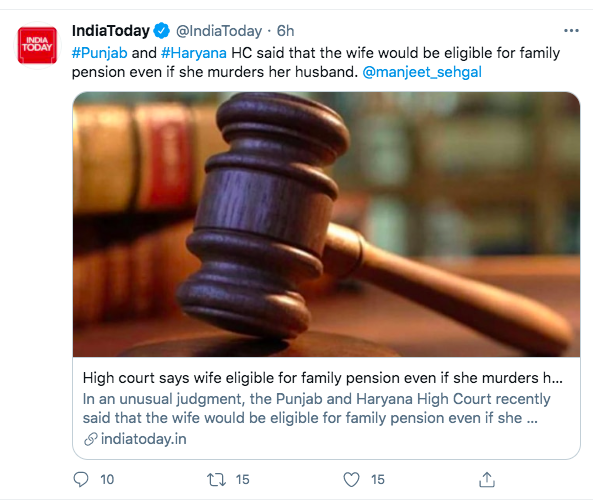In the past week, we have been seeing huge uproar towards a particular Judge at Bombay High Court Nagpur Bench for her respective bail orders in POCSO cases. While media has been discussing and debating the detailed orders in 60-280 character headlines, often we do not see even 1% of outrage in orders such as below.
In a recent judgement by the Punjab and Haryana High Court dated January 25, the court said that the wife would be eligible for family pension even if she is convicted for murder.
Case:
The court was hearing a petition filed by one Baljeet Kaur of Ambala, who told the court that her husband Tarsem Singh was a Haryana government employee who passed away in 2008. In 2009, she was booked for murder and was later also convicted in 2011.
Baljeet Kaur was getting the family pension till 2011 but the Haryana government stopped the pension immediately after her conviction.
In view of the Rules of 2006 (Deceased Government Employees Rules, 2006), the financial assistance became payable on the death of any Government employee, to the family of such deceased employee.
Haryana Government Order & Case of the Wife
The Authorities cited her conduct to deny the said benefits to her. It was stated that she had been convicted by the Court and, therefore, pecuniary benefits could not be extended to her on both accounts monthly financial assistance and the liability of family pension.
Resultantly, the woman filed a writ in the nature of mandamus seeking release of the:
- Benefits of family pension including the arrears of monthly financial assistance
- Family pension
- Other benefits along with the arrears of revised pay on account of revision of pay scale from November, 2011 and other admissible benefits due to Tarsem Singh (her husband) who had died during service on 17th November 2008
Punjab & Haryana Court
On conjoint reading of 2006 Rules, Punjab Civil Service Rules & Family Pension Rules, 1964, the Court found that the Rules talk about the withholding or withdrawing of the pension in case of conviction of a pensioner of a serious crime or his guilty of gross misconduct but the same does not refer to the family member receiving financial aid.
Also, the Court observed that there is nothing mentioned about the misconduct, as such, of the family members for not being entitled for the monthly financial assistance.
Thus, the Court opined that receiving the monthly financial assistance could not have been denied by the respondents as per Punjab Civil Service Rules.
In this backdrop, the Court opined,
It is not disputed that the petitioner-widow has committed the offence of murder and is on bail and her sentence has been suspended and, therefore, she requires to maintain herself and cannot be denied the financial assistance and it is not a bounty, as such, and is her right on account of the services rendered by her husband to the Government.
Further, taking into account the Family Pension Rules, 1964 [Rule 4(a) and (b)], the Court observed that the same relate to the eligibility to receive the family pension if a person is charged with the offence of murdering the Government employee or for abetting in the commission of such an offence.
In the present case, the Court noted, the conviction of the petitioner is not on account of murdering her own husband Tarsem Singh.
Thus, the Court said,
The said provision, as such, cannot be relied upon by the respondents to deny the claim of the petitioner as it is a disqualification to the other family members for receiving benefits, which are arising out of the right to receive the family pension. Only if the Government employee has been murdered, the disqualification, as such, would arise.
The Court also observed that Rule 4(a) and (b) of the Family Pension Rules, 1964 is based on the principle as provided under Section 25 of the Hindu Succession Act, 1956.
Under Section 25 of the HSA, 1956, wherein any person who commits murder or abets the commission of murder is disqualified from inheriting the property of the person murdered, or any other property in furtherance of the succession to which he or she committed or abetted the commission of offence.
In other words, the Court said,
The purpose behind Rule 4-A(a) of the Family Pension Rules, 1964 is to debar the family members, as such, from getting the family pension if they are involved in committing the murder or abetting the murder of the Government employee on the old fable that `one cannot kill the goose which lays the golden eggs.
Note:
While this article has been published with below headlines on several mainstream media portals, we are posting the full order below for detailed interpretation.


ALSO READ –
http://voiceformenindia.com/in-the-news/chennai-family-killed-over-a-divorce-settlement-gone-sour/
We are now on Telegram. You can also join us on our Facebook Group
Join our Facebook Group or follow us on social media by clicking on the icons below
If you find value in our work, you may choose to donate to Voice For Men Foundation via Milaap OR via UPI: voiceformenindia@hdfcbank (80G tax exemption applicable)






























